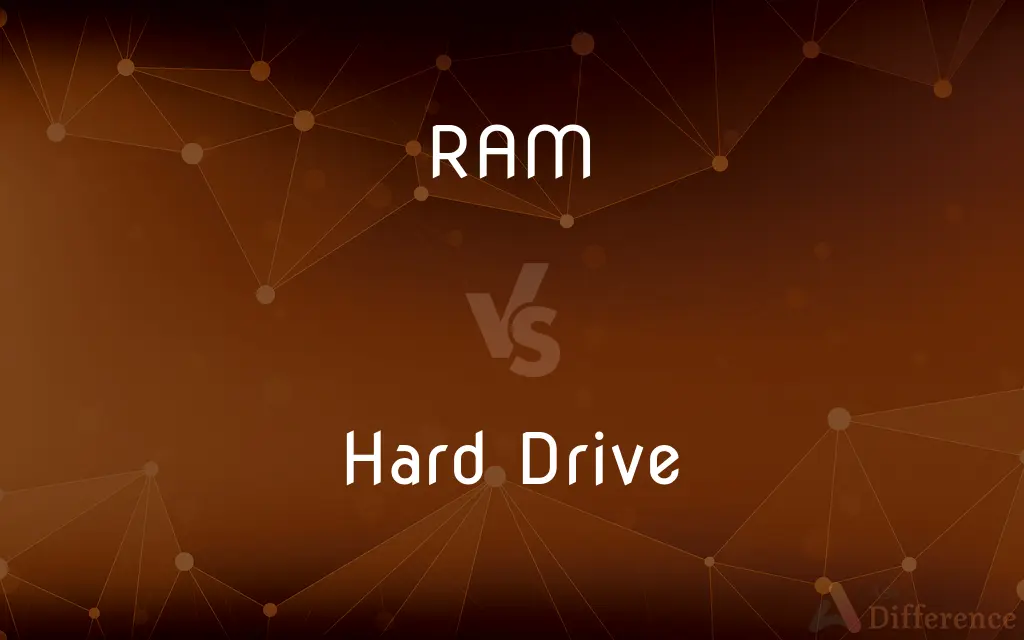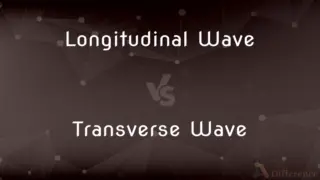RAM vs. Hard Drive — What's the Difference?
Edited by Tayyaba Rehman — By Fiza Rafique — Published on November 8, 2024
RAM (Random Access Memory) is volatile memory used for temporary data storage during operation, while a Hard Drive stores data permanently, offering larger capacity.

Difference Between RAM and Hard Drive
Table of Contents
ADVERTISEMENT
Key Differences
RAM is a type of computer memory that temporarily stores the data your computer is actively using, allowing for quick access and manipulation. This contributes to the system's speed and responsiveness. On the other hand, a Hard Drive is a non-volatile storage device that holds data permanently, even when the computer is turned off, making it essential for long-term data storage.
RAM is designed for speed, allowing the CPU quick access to data and applications, while its storage capacity is much smaller compared to a Hard Drive. Hard Drives offer significantly more storage space, which is why they are used for storing the operating system, applications, and files over the long term.
The data in RAM is volatile, meaning it is lost when the power is turned off. In contrast, data stored on a Hard Drive remains intact after the computer is powered down, ensuring the preservation of your files, programs, and system settings.
Hard Drives are mechanical devices with moving parts (in the case of HDDs), or they can be solid-state drives (SSDs) with no moving parts. RAM, however, is entirely electronic, consisting of integrated circuits, which contributes to its faster data retrieval speed.
The choice between RAM and a Hard Drive depends on the user's needs: RAM enhances system performance and speed, while Hard Drives provide substantial storage capacity. Both are integral to a computer's operation, serving different but complementary roles.
ADVERTISEMENT
Comparison Chart
Type of Storage
Volatile memory
Non-volatile storage
Purpose
Temporary storage for quick access
Permanent storage of data
Speed
High speed
Slower than RAM
Capacity
Smaller, usually in GB
Larger, usually in TB
Data Retention
Data lost when power is off
Data retained when power is off
Physical Form
Integrated circuits
Magnetic disks or solid-state chips
Usage Scenario
Running applications, system tasks
Storing files, operating systems
Compare with Definitions
RAM
Temporary storage for actively used data and programs.
Upgrading the RAM can significantly speed up your computer.
Hard Drive
The main storage medium for operating systems and files.
The Hard Drive stores the operating system, allowing your computer to boot up.
RAM
Measured in gigabytes (GB).
Modern computers typically come with 8 GB or more of RAM.
Hard Drive
Non-volatile storage, keeping data without power.
You can access your files on a Hard Drive even after turning off the computer.
RAM
Directly affects system performance and speed.
More RAM allows more applications to run simultaneously without slowing down.
Hard Drive
Offers large storage capacity, typically in terabytes.
External Hard Drives can be used to back up large amounts of data.
RAM
Volatile memory that requires power to retain data.
Any unsaved work is lost if the computer shuts down unexpectedly because it was stored in RAM.
Hard Drive
Can be either a traditional HDD with moving parts or an SSD.
SSDs are faster than HDDs but tend to be more expensive.
RAM
Essential for multitasking and running complex programs.
Graphic design software runs smoother with higher RAM.
Hard Drive
Stores all your computer's data permanently.
Photos, documents, and software are saved on the Hard Drive.
RAM
Digital memory hardware in which information can be accessed in any order with equal speed.
RAM
The most common computer memory which can be used by programs to perform necessary tasks while the computer is on; an integrated circuit memory chip allows information to be stored or accessed in any order and all storage locations are equally accessible
Common Curiosities
Can data in RAM be recovered after power off?
No, RAM is volatile, meaning all data is lost once the computer is turned off.
How do SSDs compare to traditional Hard Drives?
SSDs (Solid State Drives) are faster, more reliable, and use less power than traditional HDDs (Hard Disk Drives) but are generally more expensive.
Why is RAM faster than a Hard Drive?
RAM is designed for speed, allowing quick data access and manipulation, unlike Hard Drives which have slower read/write times.
What is RAM?
RAM is volatile memory used for temporary storage of data the computer needs quick access to while it's operating.
What happens if my RAM is full?
If RAM is full, the computer may become slow or use part of the Hard Drive as "virtual memory," which can significantly reduce performance.
How much storage do I need on a Hard Drive?
It depends on your data storage needs, including the size and number of files you wish to store. Many users find 1TB to be sufficient, but others may require more.
What is the lifespan of a Hard Drive and RAM?
Hard Drives typically last 3-5 years, while RAM can last longer, but both depend on usage and environmental factors.
How do I know if I need more RAM or a bigger Hard Drive?
If your computer is slow when running multiple applications, more RAM may help. If you're running out of space for files, a bigger Hard Drive is needed.
What is a Hard Drive?
A Hard Drive is a storage device used to permanently store and retrieve data, even when the computer is turned off.
Can I upgrade RAM and Hard Drive on any computer?
Most desktops allow for RAM and Hard Drive upgrades, but many laptops and some all-in-one computers have limited upgradeability.
Is it better to have more RAM or a larger Hard Drive?
Ideally, a balance of both is best, but more RAM can significantly enhance performance, while a larger Hard Drive is important for storage needs.
Can the data on a Hard Drive be recovered if it fails?
Sometimes, through professional data recovery services, though success is not guaranteed and can be costly.
Why is having more RAM beneficial?
More RAM allows a computer to run more applications simultaneously and improves overall system performance.
Do SSDs use the same interface as traditional Hard Drives?
Yes, SSDs often use the same SATA interface as traditional HDDs, making them easily interchangeable in most systems.
What's the difference between internal and external Hard Drives?
Internal Hard Drives are installed inside your computer, while external Hard Drives connect via USB or another port, offering portable storage.
Share Your Discovery

Previous Comparison
Longitudinal Wave vs. Transverse Wave
Next Comparison
Thus Far vs. So FarAuthor Spotlight
Written by
Fiza RafiqueFiza Rafique is a skilled content writer at AskDifference.com, where she meticulously refines and enhances written pieces. Drawing from her vast editorial expertise, Fiza ensures clarity, accuracy, and precision in every article. Passionate about language, she continually seeks to elevate the quality of content for readers worldwide.
Edited by
Tayyaba RehmanTayyaba Rehman is a distinguished writer, currently serving as a primary contributor to askdifference.com. As a researcher in semantics and etymology, Tayyaba's passion for the complexity of languages and their distinctions has found a perfect home on the platform. Tayyaba delves into the intricacies of language, distinguishing between commonly confused words and phrases, thereby providing clarity for readers worldwide.












































